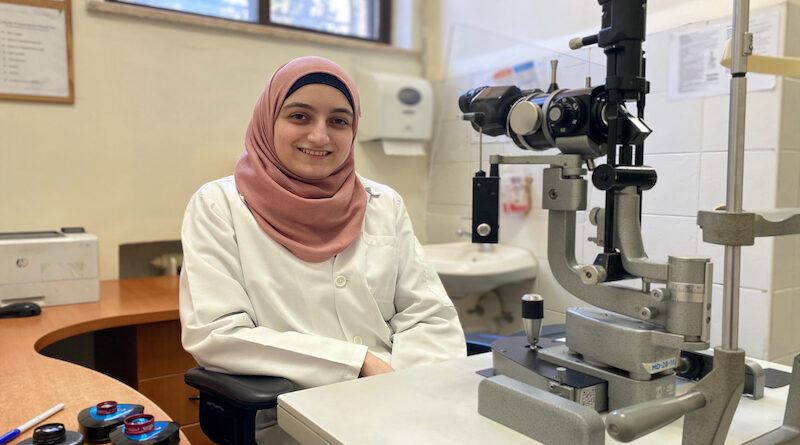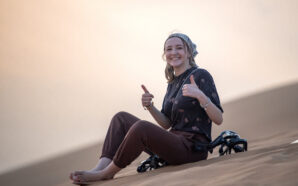This interview is part of Ananke’s special spotlight edition on The Fred Hollows Foundation‘s 30 years of change-making in the fields of development and eye care health especially across the Global South.
Tell us about yourself and your journey as a doctor? What was the aspiration behind choosing to be a medical practitioner?
I was always the top of my class throughout school’s years. I graduated school and came in first across the whole of Palestine, and I was the second best graduate of the medicine college at university. I made all this effort and hard work in order to achieve my dream, which is to work as a doctor at St. John Eye Hospital. Thanks God I realised it. I soon become an ophthalmologist, which was my ambition all along. This was made possible thanks to the Fred Hollows Foundation that supported me and gave the opportunity to work in this place.
In my fifth year at medicine school, we had to take an English language course. The professor showed us a video about blindness in Africa and I was shocked to hear about the term avoidable blindness. I always thought that a blind person is simply blind. I was very surprised when I learned that the causes for blindness are so simple, and that all you need is a simple operation, such as a cataract operation, and a person will have a new life instead of losing one’s vision. When we, as doctors, operate on cataract patients, we give them new lives, so they can care for their families and communicate with them. I was shocked to hear that and felt becoming an eye surgeon is a tremendous opportunity so that one day I can focus on the main cause of blindness around the world. That was my dream. Hence, I worked hard to pursue this specialisation, which only very few can take every year.
Other than medicine, I’m the only daughter in my family, so I’m somewhat an emotional person. I was raised by people who loved helping others, which also made me fond of ophthalmology. I consider the gift of vision to be the greatest. I also like handicrafts a lot, especially embroidery. When I operate on patients I remember how hard it was for me to learn embroidery. But with practice, you get used to it and it becomes easier.
I was born in Tulkarm, Palestine, where I lived until I was accepted at the eye hospital, so I moved out to pursue my specialisation as an ophthalmologist.
We know the challenges people face in Palestine, tell us how you work and go about especially being the only daughter in your family?
I live in Ramallah, near Jerusalem, because residing in the latter is very difficult. Hence, I live in the closest city in the West Bank. I have to cross checkpoints every day in order to get to work.
It takes me two hours back and forth.
Since I’m my family’s only daughter, the decision to move out was very tough for them. But because they know how hard I worked to realise what I want, they always supported my decisions. I always wanted to become an ophthalmologist and I wasn’t going to give up until I was in. When I got accepted, I was very happy. This was great news not only for me but also for my family. I can’t forget that day, with all its details. As I said, I was the country’s top graduate in high school. But my happiness when I was accepted for ophthalmology was bigger than that when I came in first in school. My family knew how important this was for me and they were supportive. This was no doubt difficult since I only visit them twice a month. Today I’m going to visit them. For me this is a journey that started years ago and has a human goal. Each person has to go through their own life journey.
Tell us about your work and your residency.
I’m in the third year of my residency programme, which attracts medicine graduates who want to become ophthalmologists. We begin with general knowledge about eye diseases, then we start our surgery training in the second year. Today, I was in one of the surgery theatres and operated on two cataract patients. I’m very grateful for this opportunity. Additionally, the hospital has an outreach team that visits marginalised villages on a daily basis to provide primary health care services. We examine patients and transfer some of them to hospitals.
How did you encounter the Fred Hollows Foundation?
First when I joined the hospital, I met The Fred Hollows Foundation’s representative, Ghana Bola, through whom I learned that the Fred Hollows Foundation is my sponsor. That’s how I joined the programme. My training includes lectures, surgical operations and a theoretical part. This programme allowed me to specialise in ophthalmology at the oldest eye hospital in Palestine. This opportunity spared me the trouble of traveling abroad in order to pursue a similar opportunity and obtain the same quality of education. Jerusalem’s eye hospital offers currently numerous sub-specialisations that are not available elsewhere in the West Bank. For instance, there are specialists in eye pressure, paediatrics eye care, intraocular Infections, eye nerves and other disciplines that are only available in the eye hospital in Jerusalem. Since this is such a time-honoured Hospital, I think it deserves the support that allows Palestinians an opportunity to study in it.
I really feel grateful for joining this programme that receives such a great support.
What are you planning to pursue, any specializations that you are interested in?
I would like to specialise in retinal diseases because current statistics indicates that cataract and diabetic retinopathy are the leading causes for vision loss. Therefore, I want to target avoidable blindness and treat it in Palestine. My specialisation in retinal diseases will allow me to communicate with diabetic patients and be in charge of their treatment and follow up. At the same time, I will be able to operate on cataract patients. So if I had the opportunity, I would like to pursue this sub-specialisation.
What needs to be done to improve eye care services?
According to my knowledge and based on statistics, cataract is the leading cause of blindness and 80% of the cases can be treated and avoided. We have around 130,000 people with different degrees of vision impairments. People with disabilities are three times more likely to have an eye condition compared to others. This was an important piece of information because the outreach programme, where I also work, targets this group of people and provides them with services. This gives me the opportunity to contribute in order to reduce these odds. I was also shocked, yet encouraged to develop myself, when I learned that the vision of 50 percent of the patients who were treated for cataract at our hospital over the years was well improved, while the vision of 25 percent deteriorated in spite of the operation. This means that we need to invest more in surgical talents across Palestine and train newcomers and those who are already in fellowship programmes, whether at the eye hospital or by sending them abroad. This will afford us better surgical talents and allows us to reduce the rates of this disease. The 50 percent rate of improvement is not enough when compared to the 90 percent rate across other countries, hence the need to improve. This encourages me to work harder in order to provide each patient with a satisfying results after the operation.
The majority of people are unable to afford this treatment and the government support doesn’t cover all expenses. Some people receive free-of-charge treatments paid by the funds this hospital receives. We have a hospital that doesn’t turn back any patient because of their financial situation. So the available funds are what defines our capabilities to operate on patients.
We see on daily basis patients who are unable to afford simple and routine check-ups and tests. Therefore, we transfer them to the social affairs department where they can receive the necessary support if the funds were available. Therefore, funds are essential for our services to continue and reach the whole community.
What are some of the most critical challenges as far as vision impairment is concerned?
Vision problems that require corrective glasses are the most dominant problems, especially among children, while diabetic retinopathy and cataract are the main problems for the elderly. These are the most common cases in the hospital; they account for 80% to 90% of the patients I see every day.
Humanitarian stories are abundant because we deal with the greatest gift a human can have; the gift of vision. The most touching stories I encounter are during the outreach programme, when I visit villages and see difficult cases among older people who are neglected and marginalised. If it weren’t for our visits, they wouldn’t have heard about their own health issues. Once I examined a young child who had retinal detachment. It seemed that she had had it for a while and nobody had noticed. It was painful for me to know that such a young child in the beginning of her life will lose her vision.
Hereditary retinal diseases are very upsetting as well. They are very common here due to consanguineous marriages that still exist and make these diseases so common. We have a weekly clinic for these patients, although there is no clear and real treatment for this disease yet. Most of the patients are completely blind. This pushes us to support them and follow up on them regularly. It encourages us to pursue a cure for this disease.
Any last words?
I would like to thank them for giving me an opportunity to learn and I call upon them to keep giving. Our society needs trained people who can perform major surgeries in order to improve our healthcare services. So I call upon them to continue to support this programme, so we, as doctors, can have a chance to pursue sub-specialties beyond the regular ophthalmology. The current global trend is to pursue sub-specialties that are very rare here in Palestine. I would like to go on with my education journey, specifically to pursue a sub-specialisation that takes a year or two to completed following my fellowship programme. There won’t be any financial burden compared to the result. The services that I could be able to provide to people would be priceless. I hope they continue their support after the fellowship programme at the hospital.
This interview has been lightly edited for clarity.
Questions by Sabin Muzaffar











